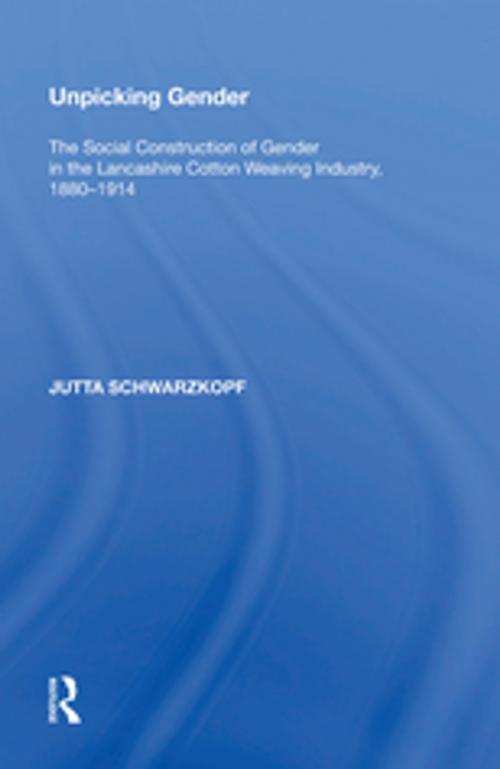Unpicking Gender
The Social Construction of Gender in the Lancashire Cotton Weaving Industry, 1880-1914
Nonfiction, History| Author: | Jutta Schwarzkopf | ISBN: | 9781351143660 |
| Publisher: | Taylor and Francis | Publication: | January 18, 2018 |
| Imprint: | Routledge | Language: | English |
| Author: | Jutta Schwarzkopf |
| ISBN: | 9781351143660 |
| Publisher: | Taylor and Francis |
| Publication: | January 18, 2018 |
| Imprint: | Routledge |
| Language: | English |
The Lancashire cotton industry doubtless counts among the most thoroughly researched industries in Britain. Cotton processing has attracted attention both as the pioneer of industrialization and the harbinger of industrial decline, in many ways typifying the development of the British economy from unchallenged global leader to the demise of large sectors of its manufacturing industry. Yet among the spate of book and articles published about the industry, there is a conspicuous lacuna. Gender, though rarely addressed specifically, permeates the industry's historiography nonetheless. This study tackles head-on the notion of gender within the cotton industry during the period 1880-1914, not so much to trace its effects on the industry itself, but instead concentrating on the ways gender radicalized particularly the female workers in the Lancashire mills. In so doing, it promotes the view that it was women weavers' experience of the way in which gender inequality in the labour process clashed with varying degrees of inequality in the other spheres of their lives that caused many of them to organize for the franchise. Their experience of equality in the labour process both sensitized them to inequality elsewhere and empowered them to fight against it by showing it to be a product of society rather than nature. 'Drawing on the examples provided by disenfranchized working-class men and middle-class women alike, they accounted for inequality in terms of their exclusion from the polity. In the process of holding their own against male co-workers, supervisory staff, employers, labour activists, politicians, and even many middle-class women, they evolved their own version of working-class femininity, which differed in important ways from the female domesticity that had a vibrant existence in labour rhetoric, but rarely beyond.
The Lancashire cotton industry doubtless counts among the most thoroughly researched industries in Britain. Cotton processing has attracted attention both as the pioneer of industrialization and the harbinger of industrial decline, in many ways typifying the development of the British economy from unchallenged global leader to the demise of large sectors of its manufacturing industry. Yet among the spate of book and articles published about the industry, there is a conspicuous lacuna. Gender, though rarely addressed specifically, permeates the industry's historiography nonetheless. This study tackles head-on the notion of gender within the cotton industry during the period 1880-1914, not so much to trace its effects on the industry itself, but instead concentrating on the ways gender radicalized particularly the female workers in the Lancashire mills. In so doing, it promotes the view that it was women weavers' experience of the way in which gender inequality in the labour process clashed with varying degrees of inequality in the other spheres of their lives that caused many of them to organize for the franchise. Their experience of equality in the labour process both sensitized them to inequality elsewhere and empowered them to fight against it by showing it to be a product of society rather than nature. 'Drawing on the examples provided by disenfranchized working-class men and middle-class women alike, they accounted for inequality in terms of their exclusion from the polity. In the process of holding their own against male co-workers, supervisory staff, employers, labour activists, politicians, and even many middle-class women, they evolved their own version of working-class femininity, which differed in important ways from the female domesticity that had a vibrant existence in labour rhetoric, but rarely beyond.















